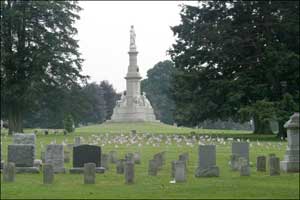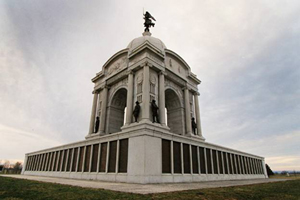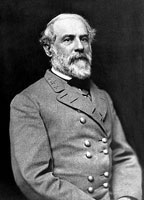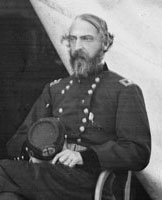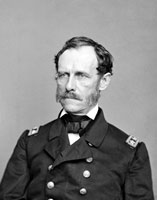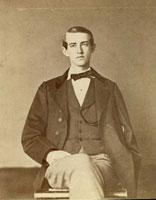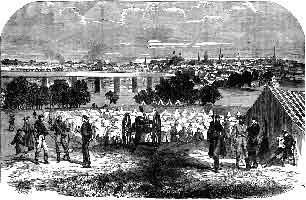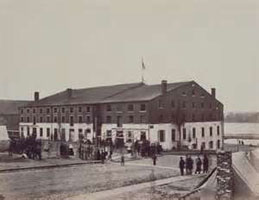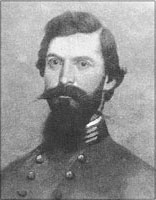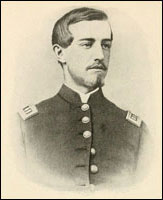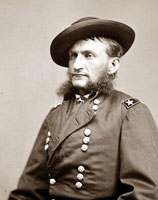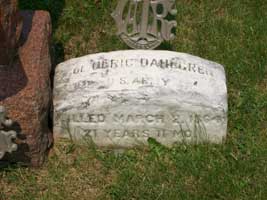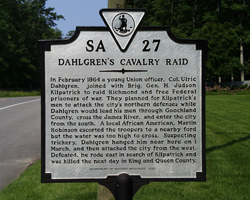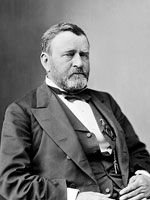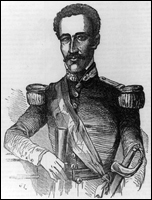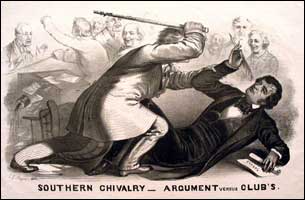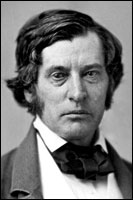GENERAL GEORGE G. MEADE WAS COMMANDING GENERAL AT GETTYSBURG. ON THE
SECOND DAY OF THE BATTLE HE WAS ABOUT TO WITHDRAW BUT WAS SHAMED INTO STAYING. AFTER THE BATTLE HE ALLOWED THE ENTIRE REBEL ARMY TO ESCAPE!! |
After his second tumultuous term was up in January 1961, President Eisenhower lived on his farm at his beloved Gettysburg.
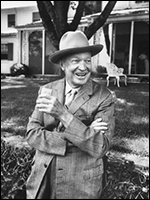 President Eisenhower relaxing on his farm at Gettysburg. |
|
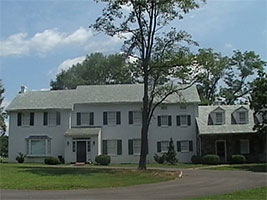 President Eisenhower's estate at Gettysburg. |
The Battle of Gettysburg was the largest battle to ever occur on the North American continent. It was a 3-day battle between Union and Confederate forces.
|
Robert E. Lee was the commander of the rebel Army of Northern Virginia, and General George G. Meade was the commander of the New Jerusalem Army of the Potomac.
|
General Meade was a Confederate in disguise and Robert E. Lee's secret weapon to destroy the Union army.
Meanwhile, up in Canada, general Sir William Williams and Colonel Garnet Wolseley waited breathlessly for good news from General Lee. The British had over 30,000 soldiers at their disposal, and they were just gung-ho to destroy the Union and avenge their defeat at the Battle of New Orleans.
Captain Ulric Dahlgren completely upset Meade's plan to retreat!!
The first 2 days of the battle were a stalemate with neither side gaining any advantage. In a council of war on July 2, General Meade decided to withdraw the Union army and redeploy to a better position.
As the meeting was about to end, in rode a 21-year-old brave cavalryman named captain Ulric Dahlgren, with captured dispatches from Jeff Davis in Richmond to General Robert E. Lee.
The dispatches revealed that Davis had no reinforcements for Lee . . . and Meade was SHAMED in staying at Gettysburg.
Ulric Dahlgren was the son of the famous naval architect John A Dahlgren who is known as the Father of American naval ordinance." The Dahlgrens were devout Swedish-American Christians and descended from the Lion of the North–King Gustavus of Sweden.
The Civil War was just as much a religious war as the 30 Years' War. During the Jesuit instigated 30 Years' War, no quarter was given and no prisoners were taken on either side, so no provision was made for prisoner-of-war camps.
|
The dispatches were not even encrypted because Jeff Davis knew that his secret weapon Meade would win the battle for him:
"Dahlgren's men did not fire a shot, but some shots were fired by some rebel soldiers who were in the rear" observed one local civilian eyewitness. "Two bullets . . . struck the Carl house . . . and the marks are to be seen to this day." They captured twenty-two rebel infantrymen and two couriers, along with two sacks of mail destined for the Army of Northern Virginia. Dahlgren spotted a valise tied to the saddle of one of the nervous couriers. The man's discomfiture piqued Dahlgren's interest. He removed the valise from the saddle and searched it. Tucked inside a shirt, to his surprise, Ulric found letters to Robert Lee from President Jefferson Davis and Adjutant General Samuel Cooper.
These letters, which were not sent in cipher or any other form of encryption, responded to a proposal by Lee that during the invasion of the north, coastal defense garrison forces be moved from North and South Carolina to reinforce Lee's army. Lee wanted these troops to assume a blocking position in Culpeper County, near Brandy Station, where they either could quickly join Lee's invading army, or protect Richmond if the Northerners attempted a counterstroke. P. G. T. Beauregard would command this pick-up force, and would be charged with relieving the pressure being placed on the Confederate capitol in the east by Union forces commanded by Maj. Gen. John A. Dix. Because of strong Federal pressure on all fronts, these coastal defense troops could not be spared. Davis vehemently denied the request while Cooper suggested that Lee detach a portion of his force to guard his lines of communication with Richmond. (Wittenberg, Like A Meteor Blazing Brightly, p. 133).
With the captured dispatches, Captain Dahlgren rode 30 miles to Gettysburg though rough terrain and rebel-held countryside. He arrived just as Meade was holding a meeting with his fellow officers:
Meade had been consulting with his corps commanders, and had resolved to withdraw his army to Pipe Creek, the position that had been previously selected by General Warren, his chief of engineers, and in pursuance of that plan was then engaged in retiring his heaviest pieces of artillery from the front. A perusal of the dispatch captured and presented by Dahlgren wrought a sudden change in Meade's plans and the artillery was quickly ordered back to the positions from which it had been withdrawn, and the Federal army made ready to recommence the battle on the following morning. (Wittenberg, Like A Meteor Blazing Brightly, p. 134).
The traitor Meade was embarrassed into staying at Gettysburg and fighting it out with the rebels. The result was a great victory for the Union and the turning point in the Civil War.
Captain Dahgren pursued the retreating rebels relentlessly, but he was shot in the leg, and had to withdraw from the pursuit of Lee. On the other hand, Meade stayed in his tent and allowed the entire rebel army to escape back into Virginia and safety.
The false flag Dahlgen raid on Richmond!!
Because of his heroism at the Battle of Gettysburg, captain Dahlgren was promoted to colonel. He was only 21 years of age but his wounded leg had to be amputated.
The Battle of Gettysburg forced the British and the Confederates to change their strategy completely. Unable to conquer the North, they resorted to a strategy of using terrorism, arson, sabotage, biological warfare, and finally the assassination of President Lincoln.
Conditions in the Confederate prisons were abysmal and colonel Dahgren vowed that he would never be taken alive.
|
David Todd, the brother of Mary Lincoln, was a notorious sadistic guard in the Libby Prison.
|
These notorious prison camps were the forerunners of the British South African camps and the Nazi camps in Germany.
To justify this new and diabolical form of warfare, false papers were planted on colonel Dahlgren and he was sent on a fool's errand to rescue prisoners-of war from the notorious Libby and Belle Isle prisoner-of-war camps.
As reports began to filter into Washington it became clear that the conditions of these prisoners was appalling. With Lee hard pressed to feed his own army, Union prisoners were at greater risk of malnutrition and starvation. Not only were prisoners suffering from a shortage of rations, but word also reached Lincoln that the men were often subjected to brutal treatment by sadistic guards. To make matters worse, Mary Lincoln's brother, Captain David Todd, was one of the wardens in charge of Libby prison. Sergeant Charles Whitcomb, a Michigan cavalryman, told a House committee investigating the treatment of Union prisoners how Captain Todd had slashed him across his leg with a saber in an unprovoked attack simply because he hated Yankees.Such treatment was believed common in Richmond's prisons. Lincoln felt increasing pressure to take action. (Steers, Blood on the Moon, pp. 42-43).
A raid was planned on Richmond led by a rake named general Hugh Judson Kilpatrick. His men referred to him as "kill-cavalry" because of his disdain for the life of his fellow soldiers.
|
The raid was planned by Secretary of War Edwin Stanton and general George Meade. It was a suicidal, foolhardy scheme to begin with, and had little chance of success.
You have been selected from brigades and regiments as a picked command to attempt a desperate undertaking—an undertaking which, if successful, will write your names on the hearts of your countrymen in letters that can never be erased, and which will cause the prayers of our fellow-soldiers now confined in loathsome prisons to follow you and yours wherever you may go. We hope to release the prisoners from Belle Island first, and having seen them fairly started, we will cross the James River into Richmond, destroying the bridges after us and exhorting the released prisoners to destroy and burn the hateful city; and do not allow the rebel leader Davis and his traitorous crew to escape. (Schultz, The Dahlgren Affair, p. 156).
The newspapers in the South had a field day when the Dahlgren Papers were published. The raid was viewed as an act of terrorism and Colonel Dahgren was called Ulric the Hun. After the war, the papers fell into the possession of Edwin Stanton and then disappeared.
|
The raid was a typical British secret service false flag operation. Colonel Dahlgren was accused of TERRORISM toward the South so this justified a reign of terror by the British from Canada–concluding with the assassination of President Lincoln.
President Grant tried to annex the Dominican Republic to the New Jerusalem!!
After Meade allowed the entire rebel army to escape, President Lincoln left Meade in command, but appointed over him General Ulysses S. Grant. Through brute force, Grant wore down the rebels, while General Sherman advanced north to make sure they would not escape again.
Grant's only talent was as a soldier . . . but Lincoln's elevating him to the supreme command guaranteed his election to the Presidency.
President Grant ignored the British threat from Canada, but he fought a ferocious battle to have the Dominican Republic annexed to the United States.
The tiny Haitian Republic would have disappeared forever if the Dominican Republic was annexed to the giant United States.
|
Grant's Presidency was one of the most corrupt in U.S. history. All of the Presidents that followed Lincoln were mediocrities because none of them dared enforce the Monroe Doctrine.
General Grant saw—but overlooked—evidence of British involvement on every battlefield of the Civil War with their Enfield rifles and ammunition manufactured in Britain.
Grant never made an attempt to enforce the Monroe Doctrine. but he tried to to annex the Dominican Republic instead. Grant dealt with a dictator named Buenaventura Báez, who was very anxious to annex his country to the U.S. in order to flood the country with voodoo and drugs.
Grant failed because of the fierce opposition from a patriot named Charles Sumner, who was chairman of the Senate foreign relations committee.
|
On January 10, 1870, Grant introduced the treaty to annex the Dominican Republic to the Senate. He was confident of success, and browbeat almost everybody in the Senate. Senator Sumner refused to yield and Grant lost in the end.
Grant was successful in nominating his old friend Edwin Stanton to the Supreme Court but Stanton died of a "heart attack" a few days after his confirmation by the Senate.
During the Civil War and its aftermath, loyal people still predominated in the government and country. We can thank our Great JEHOVAH that traitors like Jeff Davis, general Lee, and general Meade were still only a minority.
In 1898, another British false flag operation blew up the battleship USS Maine in Havana Harbor, and this launched the Spanish-American War, and the annexation of Puerto Rico—a Spanish speaking country—to the United States!!
The Gettysburg Address
The Gettysburg Address was deliverd by President Lincoln on November 19, 1863:
| "Four
score and seven years ago, our fathers brought forth on this continent
a new nation: conceived in liberty, and dedicated to the proposition that
all men are created equal.
Now we are engaged in a great civil war. . .testing whether that nation, or any nation so conceived and so dedicated. . . can long endure. We are met on a great battlefield of that war. We have come to dedicate a portion of that field as a final resting place for those who here gave their lives that that nation might live. It is altogether fitting and proper that we should do this. But, in a larger sense, we cannot dedicate. . .we cannot consecrate. . . we cannot hallow this ground. The brave men, living and dead, who struggled here have consecrated it, far above our poor power to add or detract. The world will little note, nor long remember, what we say here, but it can never forget what they did here. It is for us the living, rather, to be dedicated here to the unfinished work which they who fought here have thus far so nobly advanced. It is rather for us to be here dedicated to the great task remaining before us. . .that from these honored dead we take increased devotion to that cause for which they gave the last full measure of devotion. . . that we here highly resolve that these dead shall not have died in vain. . . that this nation, under God, shall have a new birth of freedom. . . and that government of the people. . . by the people. . . for the people. . . shall not perish from the earth. " |
This is the finest and briefest summation of the Republican creed that has ever been spoken....President Lincoln had the ability to say more in a few words than most authors can say in volumes!!
References
Berry, Stephen. House of Abraham: Lincoln and the Todds. A Family Divided by War. Houghton Mifflin Company, Boston, MASS, 2007.
Foreman, Amanda. A World on Fire: Britain's Crucial Role in the American Civil War. Random House, New York, 2010.
Guttridge Leonard F. & Neff, Ray A. Dark Union: The Secret Web of Profiteers, Politicians & Booth Conspirators That Led to Lincoln's Death. John Wiley & Sons, Inc., Hoboken, NJ, 2003.
Martin Samuel J. "Kill-Cavalry" The Life of Union General Hugh Judson Kilpatrick. Stackpole Books, Mechanicsburg, PA. 2000.
Steers, Edward Jr. Blood on the Moon: The Assassination of Abraham Lincoln. University Press of Kentucky, Lexington, Kentucky, 2001.
Schultz, Duane. The Dahlgren Affair: Terror and Conspiracy in the Civil War. W.W. Norton & Company, New York, 1998.
Smith, Jean Edward. Grant. Simon & Schuster, New York, 2001.
Wittenberg, Eric, J. Like A Meteor Blazing Brightly: The Short but Controversial Life of Colonel Dahlgren. Edinburgh Press, Roseville, Minnesota, 2009.
Copyright © 2016 by Patrick Scrivener
